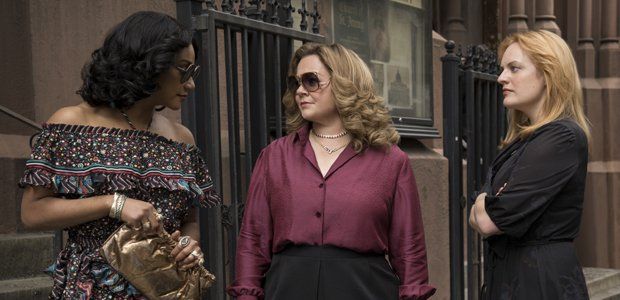While there are some movies released that make you question a studio’s entire development strategy, by contrast it’s actually very easy to see why Andrea Berloff’s The Kitchen wound up getting the green light. Comic book movies are undeniably popular right now; women fighting back against systemic misogyny is a major part of the current zeitgeist; and it has some tremendous talent involved – including an Oscar-nominated first time director, and three excellent leads. On paper it’s a film with a lot going for it – but unfortunately it’s also a film that doesn’t quite find a way to be more than the sum of its parts.
It certainly has a smart central premise, and its cast delivers, however, it also suffers from a tepid plot that offers no real surprises, and is content to just deliver by-the-numbers gangster genre material instead of anything genuinely new.
The Kitchen is an adaptation of the DC/Vertigo comic of the same name by Ollie Masters and Ming Doyle, and transports audiences back to late 1970s Hell’s Kitchen in New York, a territory claimed by the Irish mob. The story begins as three gangsters (James Badge Dale, Jeremy Bobb, and Brian d'Ary James) get caught by the FBI during a robbery attempt and are sentenced to multiple years in prison, leaving their wives – Ruby (Tiffany Haddish), Claire (Elisabeth Moss), and Kathy (Melissa McCarthy) – trapped in dire straits. They earn no respect from the crime family, and with zero income they have to find a way to keep a roof over their respective heads (with Kathy also having children to worry about).
Though their experience in the criminal world is periphery, having generally stayed out of their husbands’ work, it is still one they are familiar with, and so they decide to enter full bore. Their connections and know-how allow them to hit the ground running, starting up a protection racket and executing some intimidation plays, but it’s activity that quickly creates a lot of noise. It doesn’t take long for the competition to feel threatened, including both the Irish and the Italians, and it forces the women to show their real strength.
If not just because the period gangster movie isn’t a genre that we see a lot of these days, there’s a lot to appreciate about just the standard trappings of The Kitchen. It grapples with the moral complexities of its rising anti-heroes, has a handful of shocks with dramatic violence (while never being gratuitous or glorifying), and captures the unique flavor of its time and place. The issue is that it doesn’t really possess much more than that, as the narrative only has one gear that it coasts in from basically start to finish – with the exception of a single “twist” that arrives in the third act and feels less like a startling plot point than a last-minute realization of how flat the story plays.
It takes the movie very little time to set up the main thrust of its story (it can be said that overall it is well-paced), but once that’s done it’s all about playing that single note all the way through to the end without any big change-ups or intensification. Ruby, Claire, and Kathy quickly establish that they know what they are doing, and from there work to handle the criminal elements that stand to impede their progress… and that’s basically it. Though they take different forms, the threats they go up against all basically represent the same kind of danger, and without any kind of escalation it loses audience engagement.
Parallel issues are found in The Kitchen’s performances and characters as well. As is expected from actors of their caliber, the leads are well cast and give Ruby, Claire and Kathy the proper and necessary projected strength, with Tiffany Haddish legitimately surprising in her first purely dramatic role. What’s offered by the material, though, are archetypes that don’t ever pop. Each of the protagonists has their own specific motivation to take what they can get in the world of crime – Ruby defending herself from her racist in-laws, Claire a victim of abuse learning to fight back, and Kathy providing for her family – but none of them are given much room to grow from that simple starting place.
Thanks in large part to the contributions of filmmakers like Francis Ford Coppola and Martin Scorsese, the gangster genre has a storied cinematic legacy, and while The Kitchen lightly taps into that energy, the emphasis is on “lightly.” It’s far from a disaster, but also just doesn’t amount to much, proving to be a lightweight diversion that is mostly forgettable.

Eric Eisenberg is the Assistant Managing Editor at CinemaBlend. After graduating Boston University and earning a bachelor’s degree in journalism, he took a part-time job as a staff writer for CinemaBlend, and after six months was offered the opportunity to move to Los Angeles and take on a newly created West Coast Editor position. Over a decade later, he's continuing to advance his interests and expertise. In addition to conducting filmmaker interviews and contributing to the news and feature content of the site, Eric also oversees the Movie Reviews section, writes the the weekend box office report (published Sundays), and is the site's resident Stephen King expert. He has two King-related columns.
Most Popular






